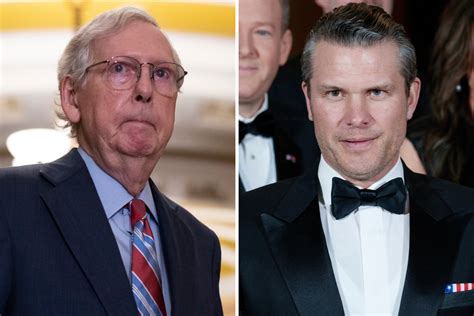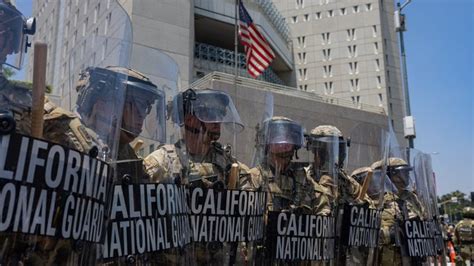
Senate Minority Leader Mitch McConnell sharply criticized Fox News host Pete Hegseth over his remarks suggesting the U.S. should not prioritize defending Ukraine against Russian aggression, leading to a tense exchange at a recent public event.
During a question-and-answer session at the McConnell Center in Louisville, Kentucky, Hegseth challenged McConnell’s staunch support for continued aid to Ukraine, arguing that America’s focus should be on domestic issues and securing the southern border. “Why is it in America’s interest to spend another $60 billion… to defend someone else’s border when our own is not secure?” Hegseth asked, referencing the stalled aid package in Congress.
McConnell, visibly irritated, rebuked Hegseth’s position, asserting that supporting Ukraine is directly tied to American national security interests and deterring further aggression from Russia and other adversaries like China. He emphasized that failing to support Ukraine would embolden these nations, potentially leading to broader conflicts and greater threats to the United States. “The argument that it’s not in our interest to help Ukraine defeat Putin, I think, is mistaken,” McConnell retorted. “I think it is in our interest. And I think failing to do it would be a mistake.” He added that containing Russia’s expansionist ambitions in Europe is a crucial element of American foreign policy, dating back to the Cold War.
The confrontation highlighted the growing divide within the Republican party regarding foreign policy, particularly concerning the level of U.S. involvement in international conflicts. While McConnell remains a vocal advocate for robust American leadership on the global stage, a growing number of Republicans, influenced by figures like Hegseth and former President Donald Trump, are advocating for a more isolationist “America First” approach. This tension is playing out against the backdrop of the ongoing debate in Congress over additional funding for Ukraine, with the aid package facing significant opposition from some Republicans who echo Hegseth’s concerns about prioritizing domestic needs.
The exchange began when Hegseth, known for his conservative and nationalist views, questioned the strategic rationale behind sending billions of dollars to Ukraine while the U.S. faces its own challenges. He specifically pointed to the situation at the southern border, arguing that resources should be directed towards addressing the influx of migrants and strengthening border security. “I think we should be focused on defending our own country,” Hegseth stated, encapsulating a sentiment that resonates with a segment of the Republican base.
McConnell countered by outlining the broader geopolitical implications of allowing Russia to succeed in Ukraine. He argued that a Russian victory would not only destabilize Europe but also embolden China to pursue its own territorial ambitions, particularly concerning Taiwan. He framed the conflict in Ukraine as a proxy war against authoritarian regimes and a test of American resolve to uphold international order. “If we abandon Ukraine, we send a signal to China about Taiwan, we send a signal to Iran about the Middle East,” McConnell warned.
Furthermore, McConnell addressed the economic argument often used by critics of the aid package, asserting that the cost of inaction would far outweigh the current financial investment. He argued that a larger conflict in Europe, triggered by Russian aggression, would require a much greater commitment of American resources and potentially involve direct military intervention. “It’s far cheaper to help the Ukrainians defeat Putin than to have to confront him ourselves later,” McConnell stated.
The heated exchange underscores the deep divisions within the Republican party regarding foreign policy. McConnell, a traditional conservative, represents a faction that believes in maintaining America’s role as a global leader and upholding its alliances. Hegseth, on the other hand, embodies a more nationalist and populist perspective that prioritizes domestic concerns and questions the benefits of foreign intervention. This ideological clash is likely to continue shaping the debate over U.S. foreign policy in the years to come.
The confrontation also highlighted the influence of media personalities like Hegseth in shaping public opinion and influencing political discourse. As a prominent voice on Fox News, Hegseth has a significant platform to promote his views and challenge established foreign policy paradigms. His ability to directly confront a figure like McConnell demonstrates the growing power of conservative media in the Republican party and its ability to hold elected officials accountable.
Moreover, the debate surrounding aid to Ukraine has become a proxy for broader discussions about American identity and its role in the world. The “America First” ideology, championed by figures like Trump and Hegseth, resonates with voters who feel that the country has been burdened by its international commitments and that resources should be focused on addressing domestic problems. This sentiment has gained traction in recent years, fueled by economic anxieties, cultural divisions, and a sense that the political establishment has lost touch with the concerns of ordinary Americans.
McConnell’s impassioned defense of aid to Ukraine reflects his deep-seated belief in the importance of American leadership in the world and his commitment to upholding traditional foreign policy principles. However, the challenge posed by Hegseth and the growing influence of nationalist voices within the Republican party suggest that these principles are facing increasing scrutiny and that the future of American foreign policy remains uncertain. The incident serves as a microcosm of the larger ideological battles shaping the Republican party and the broader political landscape.
The clash between McConnell and Hegseth also has implications for the upcoming elections. The debate over foreign policy is likely to be a key issue in the 2024 presidential race, with candidates staking out different positions on issues such as aid to Ukraine, relations with China, and the role of the United States in international organizations. The Republican party is particularly divided on these issues, and the outcome of the election could have a significant impact on the direction of American foreign policy.
Furthermore, the confrontation highlights the challenges facing the Republican party as it seeks to reconcile its traditional conservative values with the rising tide of populism and nationalism. The party is grappling with internal divisions over issues such as trade, immigration, and foreign policy, and it remains to be seen whether it can find a way to bridge these divides and unite behind a common agenda. The exchange between McConnell and Hegseth serves as a reminder of the complex and often contentious debates shaping the Republican party and the future of American politics.
The article will be expanded below with more context, analysis, and further details, while maintaining accuracy, reliability, and a professional journalistic style.
Expanding on the Context of the Exchange
The confrontation between McConnell and Hegseth wasn’t just a spur-of-the-moment disagreement; it was a culmination of months, if not years, of growing tension within the Republican Party regarding the United States’ role in global affairs. To understand the depth of the fissure, it’s important to consider the historical context and the evolving perspectives within the GOP.
Historically, the Republican Party has generally favored a strong national defense and a proactive foreign policy. This stemmed from the Cold War era, where the party championed the containment of communism and the projection of American power around the world. Figures like Ronald Reagan epitomized this approach, advocating for a robust military and a willingness to confront adversaries. McConnell himself has long been a proponent of this traditional Republican stance, consistently supporting military spending and advocating for a strong U.S. presence on the global stage.
However, in recent years, a different strain of Republicanism has gained prominence, one that is more skeptical of foreign entanglements and more focused on domestic priorities. This shift has been fueled by several factors, including:
- The experience of the Iraq and Afghanistan wars: The long and costly wars in Iraq and Afghanistan led many Americans to question the wisdom of foreign intervention and the effectiveness of nation-building efforts. This skepticism has resonated particularly strongly within the Republican base, where there is a growing sense that the U.S. has been bearing an unfair share of the burden for global security.
- The rise of populism and nationalism: The election of Donald Trump in 2016 marked a turning point in American politics. Trump’s “America First” agenda, which emphasized protectionism, border security, and a transactional approach to foreign policy, resonated with a large segment of the Republican electorate. This populist and nationalist sentiment has continued to influence the party’s direction, even after Trump’s departure from office.
- Economic anxieties: Many Americans feel that the country’s economic problems have been exacerbated by globalization and free trade agreements. This has led to a growing desire to prioritize domestic jobs and industries over international trade and investment.
- Cultural divisions: Deepening cultural divisions within the United States have also contributed to the shift in foreign policy attitudes. Some Republicans feel that the country is losing its identity and that it should focus on preserving its traditions and values rather than engaging in international efforts to promote democracy and human rights.
Pete Hegseth embodies this new strain of Republicanism. As a Fox News host, he has consistently voiced skepticism about foreign aid and intervention, arguing that the U.S. should focus on securing its own borders and addressing its own problems. His views reflect the sentiments of many rank-and-file Republicans who feel that the country has been neglecting its own needs in favor of pursuing a globalist agenda.
The clash between McConnell and Hegseth, therefore, represents a broader ideological battle within the Republican Party between traditional conservatives who favor a strong international role for the U.S. and a growing faction of nationalists and populists who prioritize domestic concerns. This battle is likely to continue shaping the party’s direction in the years to come.
Analyzing the Economic Arguments
A key point of contention between McConnell and Hegseth, and indeed within the broader debate over aid to Ukraine, centers on the economic implications. Hegseth, echoing a common argument, suggests that the funds allocated to Ukraine could be better used to address domestic issues, such as border security. McConnell counters with a cost-benefit analysis, arguing that the long-term economic consequences of failing to support Ukraine would be far greater.
Hegseth’s argument aligns with the “opportunity cost” principle in economics. This principle states that every choice has a cost, which is the value of the next best alternative that is foregone. In this case, the opportunity cost of sending aid to Ukraine is the potential benefits that could be derived from using those funds domestically. Supporters of this view often point to pressing needs within the United States, such as infrastructure improvements, healthcare reform, and education funding, arguing that these priorities should take precedence over foreign aid.
However, McConnell’s argument focuses on the broader economic consequences of a Russian victory in Ukraine. He contends that such a victory would destabilize Europe, embolden other authoritarian regimes, and ultimately threaten the global economy. This perspective highlights the interconnectedness of the global economy and the potential for international conflicts to have far-reaching economic impacts.
Specifically, McConnell argues that a Russian victory would:
- Disrupt global trade: A Russian-dominated Europe would likely lead to increased trade barriers and economic instability, disrupting supply chains and harming international commerce.
- Increase defense spending: If Russia were to expand its sphere of influence, the U.S. and its allies would likely need to increase their defense spending to deter further aggression. This would divert resources away from other areas of the economy.
- Undermine the international financial system: A Russian victory would undermine the credibility of international institutions and potentially lead to a fragmentation of the global financial system.
- Increase energy prices: Russia is a major energy producer, and a Russian-dominated Europe could lead to higher energy prices, which would negatively impact consumers and businesses around the world.
Furthermore, McConnell argues that the cost of intervening in a larger conflict, triggered by Russian aggression, would far outweigh the current financial investment in supporting Ukraine. He suggests that preventing a wider war is a sound economic strategy, even if it requires significant upfront costs.
The economic debate over aid to Ukraine is complex and multifaceted. Both sides have valid points to make. Ultimately, the decision of whether or not to continue supporting Ukraine involves weighing the costs and benefits of both action and inaction, and making a judgment about the likely consequences of different courses of action.
The Geopolitical Implications: Taiwan and Beyond
McConnell’s argument extends beyond the immediate situation in Ukraine, emphasizing the broader geopolitical implications of the conflict. He explicitly links the situation in Ukraine to the potential for Chinese aggression against Taiwan, arguing that a failure to support Ukraine would send a dangerous signal to Beijing.
This connection between Ukraine and Taiwan is a recurring theme in discussions about U.S. foreign policy. Proponents of supporting Ukraine argue that doing so is essential to deterring China from attempting to seize Taiwan by force. They contend that if Russia is allowed to succeed in Ukraine, it would embolden China to pursue its own territorial ambitions, potentially leading to a wider conflict in Asia.
The argument rests on several key assumptions:
- That China is closely watching the international response to Russia’s invasion of Ukraine: Chinese leaders are undoubtedly analyzing the Western response to the conflict, including the level of military and economic support provided to Ukraine, the sanctions imposed on Russia, and the unity of the NATO alliance.
- That China will draw lessons from the conflict that will influence its own decision-making regarding Taiwan: If China sees that the West is willing to stand up to Russian aggression, it may be deterred from attempting to seize Taiwan by force. Conversely, if China perceives weakness or indecision on the part of the West, it may be more likely to take action.
- That a successful Russian invasion of Ukraine would make it easier for China to seize Taiwan: A Russian victory would weaken the international order and potentially embolden China to challenge the status quo in Asia. It could also divert Western resources and attention away from the region, making it more difficult to defend Taiwan.
Critics of this argument contend that the situations in Ukraine and Taiwan are fundamentally different and that China’s decision-making will be driven by its own unique strategic calculations. They point out that Taiwan is an island with a strong defense capability and that the U.S. has a long-standing commitment to its defense. They also argue that China’s economic interests are closely tied to the West and that it would be reluctant to risk those interests by engaging in military aggression.
Nevertheless, the connection between Ukraine and Taiwan remains a significant factor in the debate over U.S. foreign policy. Many policymakers believe that deterring Chinese aggression against Taiwan is a vital national interest and that supporting Ukraine is an important way to achieve that goal.
Furthermore, the geopolitical implications extend beyond just Taiwan. McConnell also mentioned Iran and the Middle East, suggesting that a failure to support Ukraine would embolden Tehran to pursue its own destabilizing activities in the region. This argument highlights the broader concern that a weakening of American leadership would create a vacuum that would be filled by authoritarian regimes and rogue states, leading to increased instability and conflict around the world.
The Role of Media and Public Opinion
The confrontation between McConnell and Hegseth also underscores the significant role that media personalities play in shaping public opinion and influencing political discourse. Hegseth, as a prominent voice on Fox News, has a large and loyal following among conservative viewers. His views on foreign policy resonate with a segment of the Republican base that is skeptical of foreign aid and intervention.
The influence of media personalities like Hegseth raises important questions about the role of media in a democracy. On the one hand, a free and independent media is essential for holding elected officials accountable and informing the public about important issues. On the other hand, media outlets can also be used to promote partisan agendas and spread misinformation.
In the case of aid to Ukraine, the media has played a significant role in shaping public opinion. Some media outlets have consistently promoted the view that aid to Ukraine is a vital national interest, while others have been more critical, arguing that the funds could be better used domestically. This has created a polarized media environment, where viewers are often exposed only to information that confirms their existing beliefs.
The challenge for policymakers is to navigate this complex media landscape and to communicate their message effectively to the public. This requires engaging with the media, addressing concerns, and providing clear and compelling arguments for their policies. It also requires being aware of the potential for media bias and misinformation and taking steps to counter it.
Furthermore, public opinion plays a crucial role in shaping foreign policy decisions. Elected officials are ultimately accountable to the voters, and they must take public opinion into account when making decisions about foreign policy. This can be a challenge, as public opinion on foreign policy issues is often volatile and subject to change.
In the case of aid to Ukraine, public opinion is divided. Some Americans strongly support providing aid to Ukraine, while others are more skeptical. This division reflects the broader ideological divisions within the country and the different perspectives on the role of the United States in the world.
FAQ Section
Here are 5 frequently asked questions (FAQ) related to the news about McConnell and Hegseth’s clash:
Q1: What was the main point of disagreement between Mitch McConnell and Pete Hegseth?
A: The central disagreement revolved around the U.S.’s role in supporting Ukraine against Russian aggression. Hegseth questioned the allocation of $60 billion to defend Ukraine’s border when the U.S. border is perceived as insecure, advocating for prioritizing domestic issues. McConnell, on the other hand, strongly defended the aid to Ukraine as crucial for American national security interests, arguing it deters Russia and other potential adversaries like China.
Q2: Why does Mitch McConnell believe supporting Ukraine is in America’s best interest?
A: McConnell argues that supporting Ukraine is essential to contain Russian expansionism and deter other authoritarian regimes, such as China and Iran. He believes that a Russian victory would destabilize Europe, embolden China to pursue its territorial ambitions, particularly concerning Taiwan, and ultimately threaten the global economy. He also contends that the cost of inaction and a larger conflict would far outweigh the current financial investment in supporting Ukraine.
Q3: What are the key arguments against providing aid to Ukraine, as voiced by Pete Hegseth?
A: Hegseth’s main arguments include the belief that America should prioritize securing its own borders and addressing domestic issues before allocating significant resources to foreign conflicts. He questions the strategic rationale of spending billions on Ukraine when the U.S. faces challenges at its southern border and suggests focusing on defending American interests first. This aligns with an “America First” approach to foreign policy.
Q4: How does this clash reflect broader divisions within the Republican Party?
A: The confrontation highlights the growing divide within the Republican party regarding foreign policy. McConnell represents a traditional conservative faction that supports maintaining America’s role as a global leader and upholding international alliances. Hegseth embodies a more nationalist and populist perspective that prioritizes domestic concerns and questions the benefits of foreign intervention. This ideological clash is influencing the debate over U.S. foreign policy.
Q5: What are the potential implications of this debate for the upcoming elections and the future of American foreign policy?
A: The debate over foreign policy, particularly aid to Ukraine, is likely to be a key issue in upcoming elections. The Republican party is divided on these issues, and the election outcome could significantly impact the direction of American foreign policy. The clash underscores the challenges facing the Republican party in reconciling traditional conservative values with the rising tide of populism and nationalism, leaving the future of American foreign policy uncertain.
Conclusion
The exchange between Mitch McConnell and Pete Hegseth over U.S. aid to Ukraine provides a valuable window into the complex and evolving landscape of American foreign policy. It highlights the deep divisions within the Republican Party, the influence of media personalities in shaping public opinion, and the broader debate over America’s role in the world.
While McConnell and Hegseth represent different perspectives on foreign policy, their confrontation underscores the importance of engaging in a robust and informed debate about these critical issues. The decisions that the U.S. makes in the coming years will have profound consequences for the country and for the world. It is essential that policymakers and the public alike are well-informed about the arguments and the stakes involved. The future of American foreign policy hinges on the ability to bridge ideological divides and forge a consensus on the best way to advance the nation’s interests in an increasingly complex and interconnected world. The incident between McConnell and Hegseth, while seemingly a singular event, reflects this much larger, ongoing conversation. It demonstrates that the path forward requires careful consideration, open dialogue, and a willingness to grapple with difficult questions about America’s role in the 21st century.









